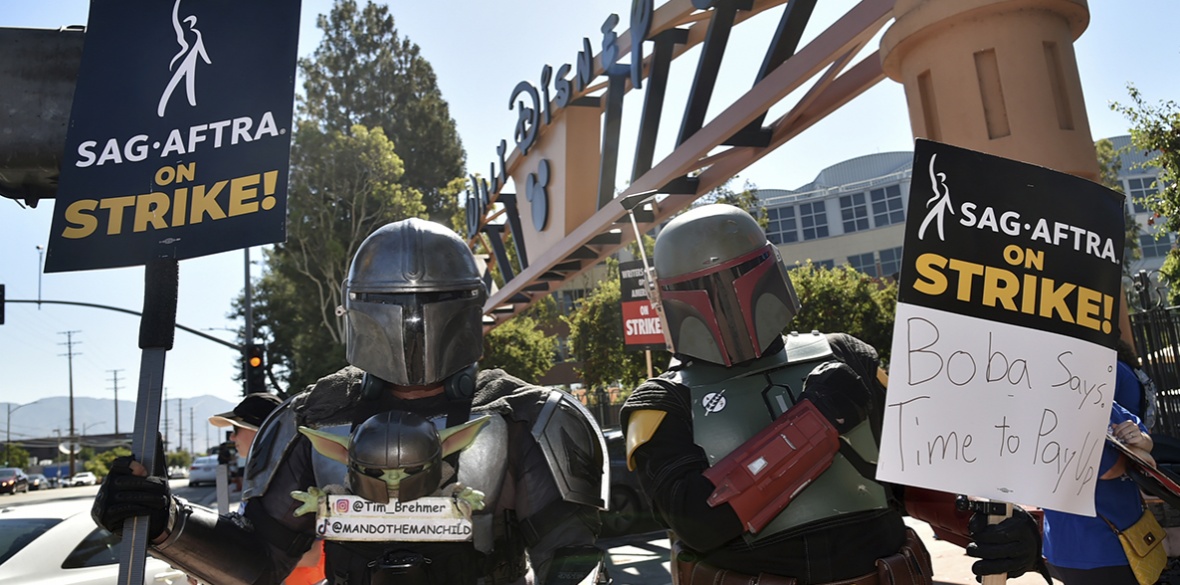This is the last article you can read this month
You can read more article this month
You can read more articles this month
Sorry your limit is up for this month
Reset on:
Please help support the Morning Star by subscribing here
WHAT campaigner could fail to envy the cast of A-listers that the Screen Actors Guild — American Federation of Television and Radio Artists has recruited to its cause?
Tom Cruise, Meryl Streep, Jennifer Lawrence, Kevin Bacon and George Clooney have been picketing film studios or showing support for the US screenwriters’ and actors’ union.
Writers such as Lucy Prebble are able to interrupt prime-time interviews about their work (in her case the final episode of Succession) to voice their support for the strike.
Trouble in Tinsel Town is news the world over.
So dazzling is the Hollywood stardust, however, that the real conflict propelling this dispute is easily obscured. Grasp its outlines, and it is clear that SAG-AFTRA’s strike has the potential to be one of the most consequential labour disputes of all time.
It’s the first major claim by creators for a fair share of whatever AI might fashion from their raw material. It has the capacity to frame similar negotiations for generations to come.
Actors’ union president Fran Dreschler hit the nail on the head: “The eyes of the world and particularly the eyes of labour are upon us. What happens to us is important. What’s happening to us is happening across all fields of labour.”
Two factors make this dispute seismic.
The first is that at its core is the economic control of the human input upon which AI depends. The union is demanding “provisions to grant informed consent and fair compensation when a ‘digital replica’ is made, or our performance is changed using AI.”
It is obvious that in the near future, if not already, AI will learn from scenes in films that have already been shot, and recreate the same characters doing different things, or saying alternative words.
It can’t do this without the raw material provided by the original actors, but it will be able to replicate their work. The same is true in every field of creation — words, music and pictures.
If creators cede their rights in the the raw material on which fresh creations depend, their ability to make a living will be grievously damaged.
And remember, like the news media, the stratospheric rewards achieved by a handful of stars are only possible because of a vast army of workers, many of whom are pitifully remunerated and exist in permanent precarity.
If SAG-AFTRA is able to secure some control over these rights, it will be pattern-making. All those whose work is consumed by machines and regurgitated as “new” works will have a chance of being properly compensated.
That includes workers far beyond entertainment and news — just think about what machine replication could do to education, the law and medicine.
The second distinguishing factor in this dispute is the parties on the other side of the negotiating table. The employers are represented by Alliance of Motion Picture and Television Producers (AMPTP). This body includes Amazon/MGM, Apple, Disney/ABC/Fox, NBCUniversal, Netflix, Paramount/CBS, Sony, Warner Bros, and Discovery (HBO).
Here are some — although not all — of the big beasts of the emerging AI economy. They are among the defining giants of the information age.
Wring a fair deal from them now, and everyone else can build on their precedent. Fail, and we will repeat the mistakes of the early internet age and the rush to give away content. Then technological novelty eclipsed economic sense. Now is the time to learn from that error.
AI has the capacity to affect almost every area of human activity. Workers of every stripe will face issues, whether it be recruitment and evaluation assessments assessed by AI, the replacement of customer-facing roles by AI bots, or the ingestion of human-created material to fuel generative AI. The application of this technology has the capacity to become the central issue in all employer-employee relations.
Many worthwhile steps are already in play to ensure that benefit is shared between workers and bosses. Prominent among these is the work of the TUC’s AI working group whose manifesto, Dignity at Work and the AI Revolution, is an excellent starting point for those trying to imagine the consequences of this technology.
The legislation it calls for to ensure that AI serves us all, nationally and internationally would, of course, be welcome. For the moment, however, it is the industrial struggle in Hollywood that represents the cutting edge.
Similar disputes will come to many other industries. In my own, the major news platforms are already reported to be in talks with the AI giants to try and secure their share of future proceeds. The campaign to ensure that the shop floor is included in those talks is already under way.
If workers are going to be treated fairly, then demonstrating our vociferous support for our SAG-AFTRA colleagues is a good start. That declaration should then be the foundation for us all to demand a seat at the negotiating table with the tech giants.
Perhaps we lack the glamour of the silver screen and the celebrity matinee idols, but for every trade unionist, recognising that all workers are fundamentally in the same boat as the Hollywood strikers is the first step to navigating the AI revolution from which we can all benefit.
Tim Dawson is deputy general secretary of the International Federation of Journalists.










